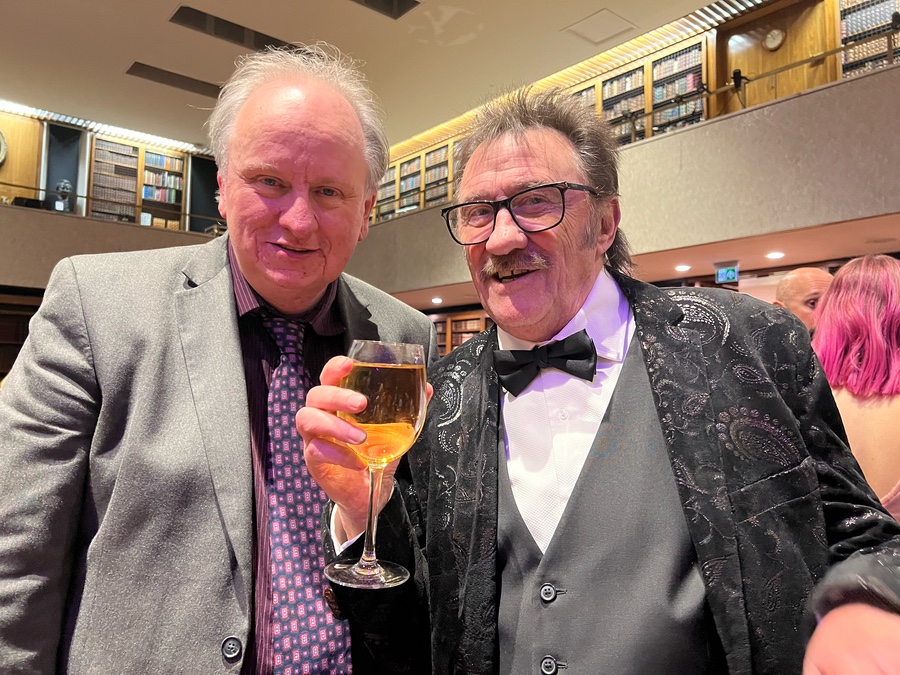Here’s a thing I did not expect, wrapped up in a lot of things that I did. The lots of things I expected are all to do with how this week, last Monday in fact, there was an awards night. The 29th Writers’ Guild of Great Britain Awards.
I was expecting these lots of things because, in a small way, I’ve been working on the event for close to a year. There were no Guild awards in 2021 because of the pandemic, and this year’s took more planning and more continually changing around than usual, also because of the pandemic.
There was one part I can say was me. I just told you it was the 29th Writers’ Guild Awards. Up until this one, each annual event had been titled with the year in the name. So the last one I did anything for was the Writers’ Guild Awards 2020. Or it could’ve been called the Writers’ Guild Awards 2019 because the ceremony was in January 2020 but it was celebrating writing done chiefly in 2019, and anyway, it was pre-COVID so there’s no chance of remembering.
It was definitely a confusing name, though. It got even more confusing in the planning of this one: the first question was whether these latest awards should honour writing over the last two years, or just sod 2020 and move on. We decided to celebrate both years, to not be beaten by having had to take a year off.
But then the question was whether to call it the Writers’ Guild Awards 2020-2021 or something like that. It was me who said we should drop the years and call it the 29th Writers’ Guild Awards. Okay, I had to find out from Nick Yapp, who wrote the history of the Guild, what number it was, but I am the one who said it should be the XXth Writers’ Guild Awards.
So that’s four words, if you count the number as a word. And all through the night when those four words were on screen, I got a bit ridiculously pleased with myself. At most three other people knew I’d thought of that, and if any of the three remember all this time later, I’ll be ridiculously surprised.
Anyway. Proud of four words.
Imagine if I’d been up for any of the awards.
Other than that, though, it was just fun and a privilege being a little part of the organising group. Seeing clever people at the top of their game, it is brilliant.
So is the night. I tell you, the best evenings I’ve ever had have been at Writers’ Guild Awards and so of course I now expect them to be fantastic. Last time, I wrote dialogue for Hartley Hare. This time, I met Paul Chuckle.
What I also expect, though, is to feel flat afterwards.
Only afterwards. Never during the event itself. The sheer volumetric pressure in that room is so happy that you cannot feel flat. Well, maybe if you don’t win an award you’re nominated for. But the sense of support and even happiness from the whole room for each writer who wins, it is joyous.
I just expect now to feel flattened around a fifth of a second after I leave. There have been some years where I’ve made it an entire second, but only when I’ve walked out with someone.
Because usually I come away with a sense of how all these superb writers, every one of these people you’d like to be just as much as you’d enjoy calling friends, each one is outclassing me as a writer. I would come away with that sense of them being better than me and it is in no way helpful to know that yep, I’m right, they are.
Come on. I just met Emerald Fennell, who wrote Promising Young Woman. I haven’t even seen her film, but I’ve read the script and right there on the page, her words left me shaking. Fantastic. She won for best screenplay this year incidentally, and I was embarrassed to realise she was sitting right behind me because I punched the air and yelled “YES!” when the result was read out.
So I am in a room of the finest writers in the land, I am completely conscious of that throughout, and it does not dent the joy – until between a fifth of a second and a full second after I’ve left.
It has got so that I expect this.
But not this time.
That’s the real unexpected thing. This time, for the first time, I did not leave there thinking I was the weakest, poorest writer. If you want to make a case that I am, I will not only nod in agreement, I will add my name to your petition.
I just didn’t feel it this time.
I felt good.
I felt I’d been where I belonged.
True, I need to write better, and also write more, and I would prefer it if I were able to write something good enough to get me nominated in the XX+1 Writers’ Guild Awards.
But I’ve found a place I think I belong.
